In Sumy region, near the Russian border, the situation is becoming increasingly hellish. Most settlements are suffering from massive shelling. Authorities are calling on locals to evacuate immediately.
However, not everyone wants to leave. Nina Skorkina initially refused to leave her home, but when explosions were heard all around, the police took the 87-year-old woman away.
Other elderly and infirm residents in one of the villages are being carried on blankets across a bridge already damaged by airstrikes.
And as Vladimir Putin celebrates the next six years of his presidency and promises to continue a major war against Ukraine, attacks on its northern border have sharply intensified.
According to Volodymyr Zelenskyy, since the beginning of March alone, the Russians have dropped almost 200 guided bombs on communities in Sumy Oblast.
“The Russian army is simply trying to burn our border villages to the ground,” the Ukrainian president said.
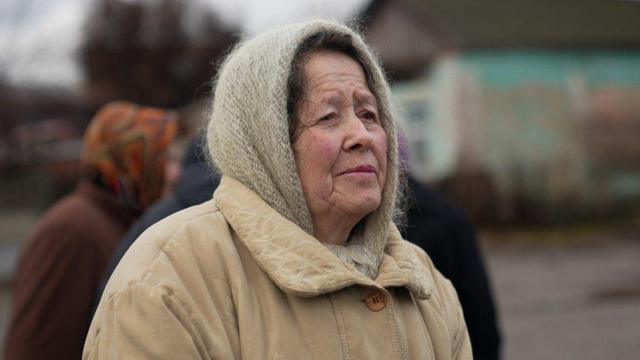
Police and State Emergency Service employees have already rescued hundreds of people in the border region of Sumy, moving them to safer places deep inside Ukraine.
Many of them are residents of Velyka Pysarivka, a village five kilometers from the border, as well as surrounding villages
Nina Makarenko said that she left her home already destroyed.
"They destroyed our houses. There's nothing left.".
All Nina brought with her were some clothes and homemade jam.
Before the war, she regularly traveled to Russia to shop. And now the Russians are shelling her house.
"It's scary. They cook during the day and they cook at night.".
The bus takes people to the small town of Okhtyrka, where local authorities have set up a temporary shelter in a kindergarten and school.
It's cozy here, psychologists work with children, and there's a lot of smiles and laughter.
But on the folding chairs arranged in the classroom, elderly women sit motionless and confused. They have lost everything they had and believed in.
The first thing I hear when I enter the room is a call for more help for Ukrainian soldiers.
“Give them weapons to knock out the Russians. This is our main request!” says Valentina. “Their planes are dropping bombs on us, and we have nothing to shoot them down!”
Her next outburst of anger concerns Vladimir Putin, who unleashed this war and has just been re-elected for a fifth term.
“Putin is our enemy! He said he would destroy Ukraine!” Tatyana passionately declares, mocking the triumphant re-election of the Russian leader. “He elected himself!”
“What have we done to him? How many people have been killed, how many have been tortured, how many have lost arms and legs. And for what?”
As Tetyana speaks, her elderly mother sobs uncontrollably next to her. Looking around, I realize that almost everyone in the room is crying.
Many people have left the border areas of Sumy Oblast since the summer of last year, when the authorities announced an evacuation there due to danger.
It is now virtually impossible to stay there. Footage taken by police rescue teams shows streets where houses have been reduced to ruins.
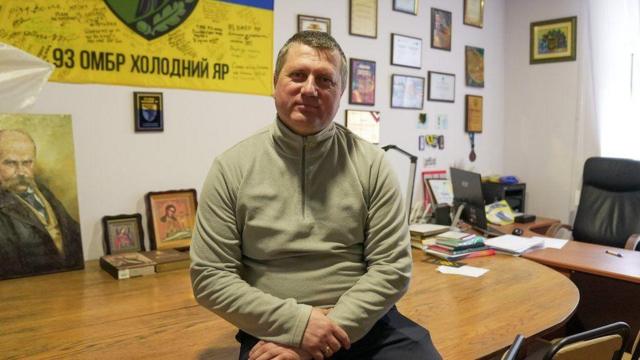
One of the possible reasons for the serious escalation in the Sumy region is the increased Ukrainian shelling of Belgorod, a Russian border city located 80 km from Kharkiv.
Recently, Vladimir Putin promised to respond to the shelling of the Belgorod region, ignoring, however, the fact that Russian missiles have been mercilessly hitting Ukrainian homes and civilian infrastructure for two years.
The mayor of Okhtyrka has a different theory of escalation.
“I understand that the enemy wants to create some kind of gray zone, where equipment cannot enter and where large groups of people cannot move freely,” suggests Pavlo Kuzmenko.
We met him at the city library because a Russian airstrike had destroyed the city council building where his office was.
“Along our entire border, the enemy is systematically creating a zone where Ukrainians will not be able to set foot,” the mayor believes.
The increased shelling of the Sumy region is also linked to raids by Russian volunteer formations on the territory of Russia (Kursk and Belgorod regions).
These forces probably wanted to show that Putin had lost control of his border. It was then, according to locals, that the Russians began actively bombing Velika Pysarivka.
“The explosions didn’t stop for a second,” says Tetyana, adding that life in the village turned into “hell.”.
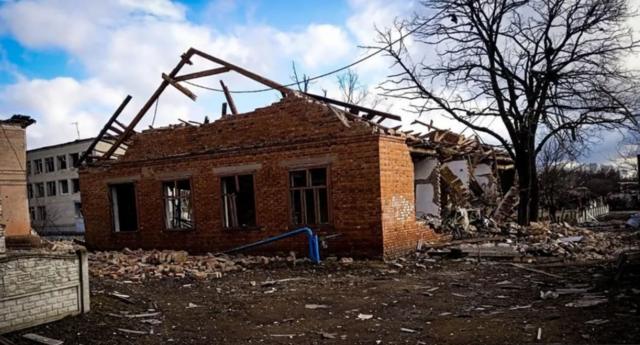
PHOTO AUTHOR, NATIONAL POLICE Photo caption, Entire streets in border villages destroyed by Russian bombs
Russian volunteer groups range from right-wing extremists to the Siberian Battalion, a group of indigenous peoples, united by the belief that only armed resistance can change Russia and overthrow Putin.
The size and military effectiveness of these forces, which are based in Ukraine and supported by Ukrainian military intelligence, remain clearly unclear.
On Thursday, at a press conference in Kyiv, a representative of one of the groups said that their raids on Russian regions bordering Ukraine had tied up the "Kremlin war machine," thwarting plans for a new offensive on Ukraine.
However, my own sources suggest that there may be as much hype here as real action.
When I asked if their achievements were worth destroying Ukrainian villages, another representative of the Russian volunteers said it was “a pity” that civilians were suffering. He added that fighting an enemy like Russia “without victims and destruction” was impossible.
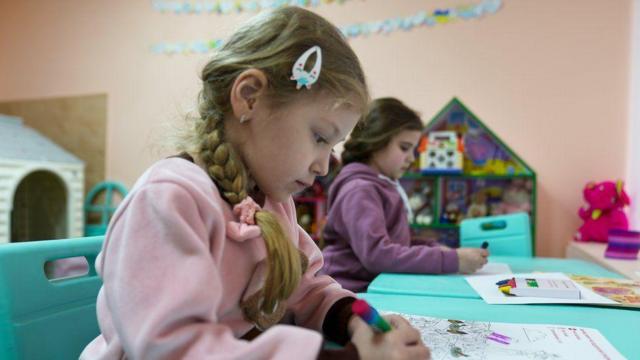
People are fleeing not only from shelling.
There is only one checkpoint on the border with Russia in Sumy Oblast.
Every day, dozens of people returning from temporarily occupied territories use this route.
Zoya Vypyraylo and her husband Mykhailo traveled here for three days. Their village in the Kherson region is now full of Russian soldiers.
“There are a lot of them. They live in houses. They live in fields. Their transport moves back and forth. And we are worried,” Zoya admitted when she finally reached the reception center.
She says that life under occupation changed her a lot: “I had no desire, no strength. We were morally dead.”.
So he and Mykhailo left everything behind. They gave the house they had lived in for 53 years to a neighbor, leaving behind the ducks, chickens, and dogs.
“We want the entire Kherson region to be under Ukraine. We really want it. But we have already lost hope,” Zoya tells me quietly and wearily.
To get to Ukraine, the pensioners had to drag their bags across a two-kilometer neutral zone.
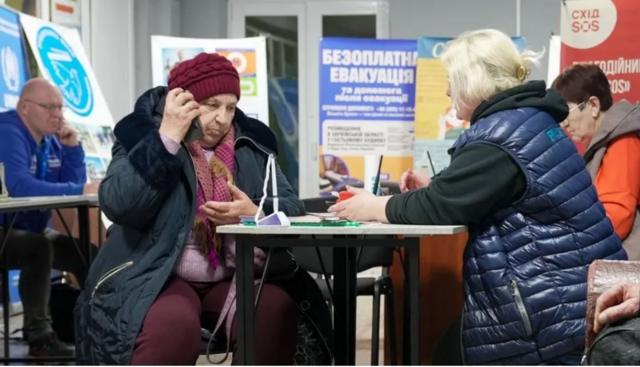
PHOTO AUTHOR, BBC Photo caption, After three days on the road, Zoya is finally able to tell her son on the phone that she is safe
The NGO “Pluriton” takes people from the border to the reception center, where they are given the opportunity to call their relatives, organize tickets for onward travel, and are treated to tea and a hot lunch.
At the same place, those who arrived also undergo document verification.
“When I look at these people, I remember myself,” says the organization’s head, Kateryna Arisoy.
She herself recently left her home in Bakhmut and is now helping other displaced people. “I can’t find the words to explain that their old lives, unfortunately, will never return,” she says.
“When we were driving here, I started crying. I breathed in the fresh air, our Ukrainian air,” says pensioner Zoya, quietly but eloquently.
For the past two years, she has been forced to abandon her own identity. And in the last presidential election in the Russian Federation, she was forced to vote for Vladimir Putin.
“We are Ukrainians. We want our country to prosper. For our children and grandchildren to live in peace,” Zoya says and starts to cry.
“I’m sorry. This is very difficult.”.
Gradually, she realizes that she is now free. But, unfortunately, Ukraine has not yet come close to peace.

